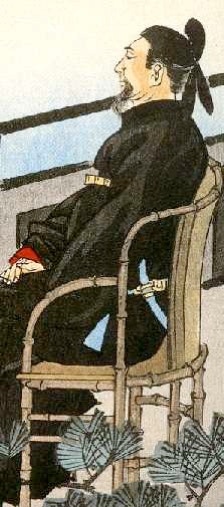Master Jyo

In the year 995, a group of shipwrecked Chinese merchants and their crew were transported to and held at the Matsubara Guest House in Echizen province. The following year a Chinese official and scholar by the name of Jyo Shichang arrived and had a poetry exchange with the new governor—Murasaki's father.
China had a long tradition of gathering information on the various countries which lay on its perimeter. Educated travelers would submit their reports which were then put into the official histories. In volume 491 of the History of the Sung Dynasty, Jyo Shichang reported that he met with a Japanese official in the province of Echizen, and that they exchanged poems. The Japanese efforts, commented Master Jyo, were "shallow, ornate, and without interest." Of course from a Chinese perspective, the poetic trends the Japanese followed were long out of date. In particular, the elaborately ornamental "Six-Dynasties" style of writing had passed out of favor in China while having become codified in the university curriculum of the Japanese intelligentsia, who studied it as a foreign language.
Politically, Japan and China had no official relationship in the tenth century, for the exchange of embassies had ceased more than a hundred years earlier in 873. The Japanese court received an envoy from the Sung court in 945, but did not encourage the re-establishment of official ties as they were suspicious of the military designs of their great neighbor to the West. Still, the Japanese remained interested in imported Chinese luxuries, and unofficial trade missions managed to bring goods into the country. Yet mistrust seems to have abounded. Right at this time a senior Chinese merchant was being prosecuted by the court for harassing the governor of the province of Wakasa. (It appears that the merchant was trying to obtain payment for Chinese goods he had delivered.) This merchant had also extended credit to the Empress Teishi for luxury items for which she had not yet paid. In the fall of 997 Korea invaded islands off the shore of Kyushu, and although this invasion was repelled, the court decided to expel foreign merchants and declared a state of hostility with China. It was at this point that Murasaki's father escorted the group of Chinese in Echizen down to the port of Dazaifu in Kyushu for repatriation.
I gave Master Jyo the hobbies and interests of an early Sung-dynasty intellectual. His interest in painting landscapes, collecting interesting rocks, and playing the 7-string ch'in would have been typical. The new-fangled way of preparing tea by whipping up a broth from finely-ground green tea leaves was also a Sung-era invention that would have been surprising to the Japanese of Murasaki's world.